After 12 years of travel and over 90 countries, I’ve come to the conclusion that Croatia is one of the most underrated travel destinations on the planet.
I’m slightly biased, of course.
When I first decided to set off on my round-the-world adventure, I decided Croatia would be the very first country on my itinerary.
It was an unusual choice, I know. Most travellers set off for Bangkok, London, Sydney, or Beijing to kickstart their gap years, but something about Eastern Europe fascinated me. I wanted to explore some of the lesser-visited parts of the continent in which I was born, and Croatia sounded like the perfect place to start.
It’s since held a special place in my heart as the destination that helped me gain my travel footing, and I immediately fell deeply in love with it.
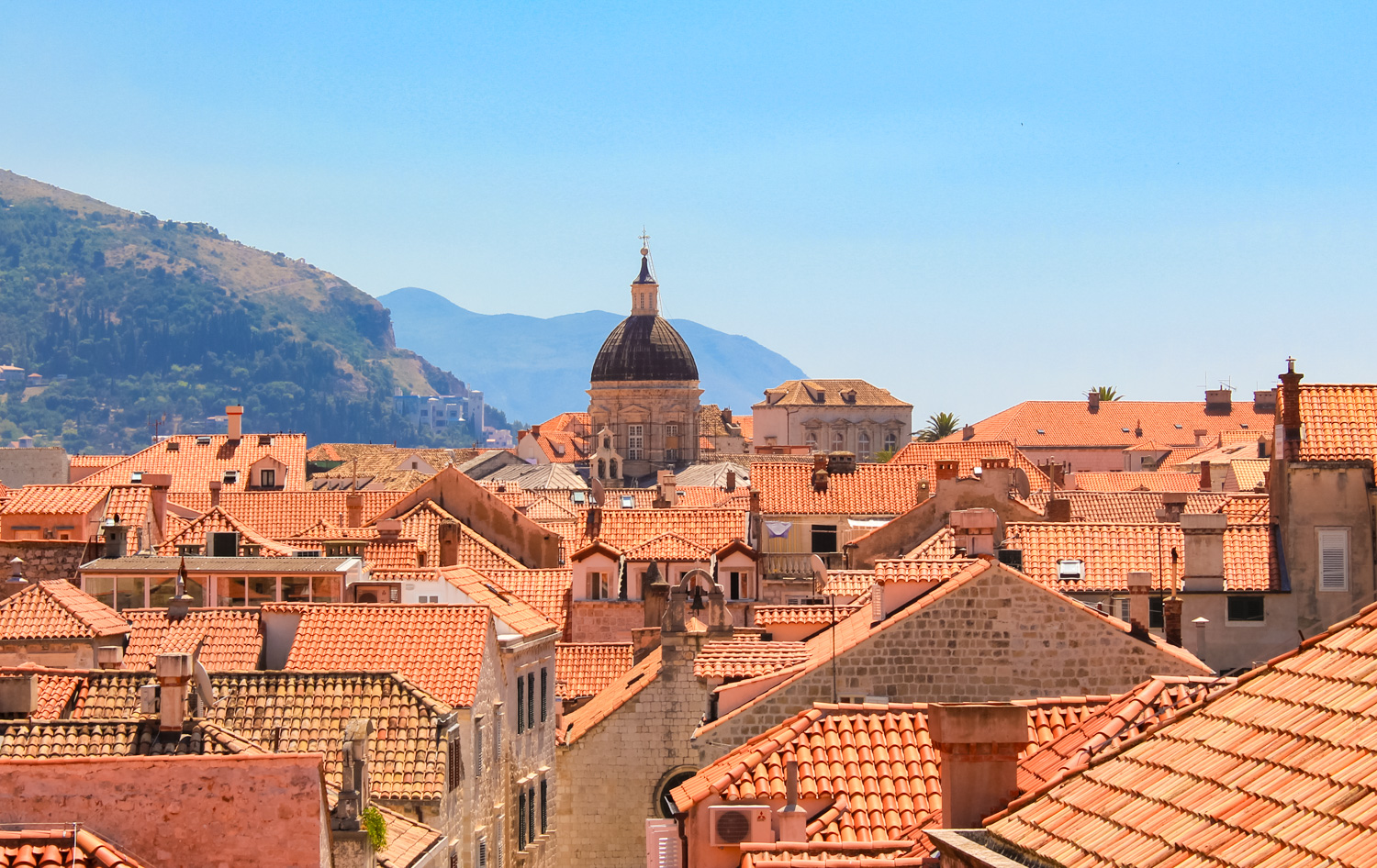
What’s not to love?
You’ve got gorgeous architecture to snap photos of, hundreds of islands to explore, the spectacular Plitvice National Park to wander around, underrated Zagreb for a city break, and some of the best beaches in the world. There are opportunities to sail the coastline, surprisingly fantastic cheese to eat, lovely locals, and so many beautiful landscapes that it’s hard to believe one country can offer up so much.
I originally planned to spend two weeks travelling around Croatia for my first visit, but after falling in love with the country, I quickly extended my stay to a full month. I hit up Dubrovnik, Split, Brac, Zadar, Pag, Zagreb, Plitvice, and Crikvenica over that time, and easily could have spent longer if I didn’t already have a flight to the other side of the world to catch.
I’ve since returned twice more to Croatia, and every time I do, I realise just how underrated a country it is.
I’ve been recording every single cent I spend in the countries I visit from day one of my travels because I want to prove that seeing the world is inexpensive and achievable. I want to be able to give a realistic and accurate look at how much you can expect to spend in each country you visit.
Today, it’s Croatia’s turn. I visited Croatia first of all as a solo backpacker, and then secondly and thirdly, as part of a couple on a mid-range budget. My costs have gone up during that time, both because my travel style changed and due to rising prices in general. Even so, as long as you’re not visiting in the height of peak season, Croatia still isn’t a crazy-expensive destination.
(As of the start of last year, Croatia adopted the Euro — not the Kuna — as its currency).
Here’s how much you can expect to spend on a trip to Croatia in 2024.
How to Save Money on Flights to/From Croatia
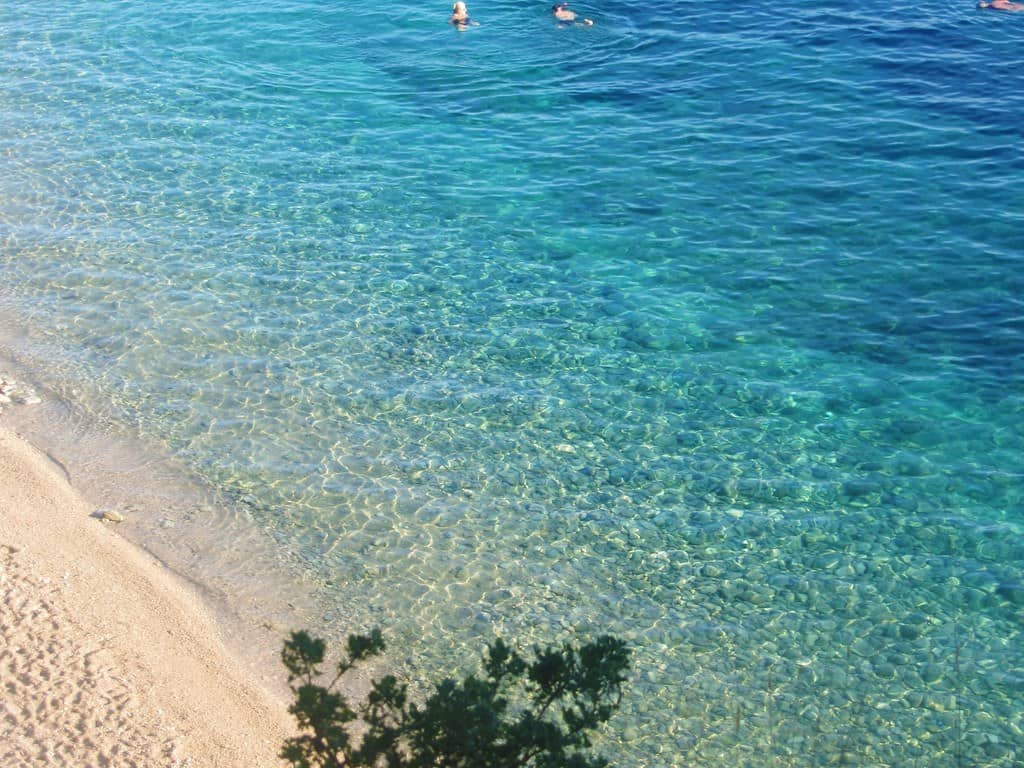
My European readers won’t have to worry too much about the cost of flights to Croatia, as the wide range of budget airlines means finding something affordable is never too much of a problem. As always, I recommend heading to Skyscanner to snag yourself a bargain.
If you’re flexible with dates and itinerary, you’ll find the best deals by searching to flights to “Croatia” rather than an individual city, as you may find it’s far cheaper to fly into Zagreb over Dubrovnik, for example. It’s also worth setting your flight departure date to be across an entire month, which you can do with Skyscanner. This will show you the cheapest dates to fly and ensure you have the very best deal possible.
In general, you’ll find that it’s cheapest to fly to Croatia outside of high season, which coincides with typical European summer vacation dates (late June to late August). May and September are the shoulder season months, and October to March is the official low season, where you’ll find the lowest prices.
If you do have the freedom to visit during shoulder season, I highly recommend it, as it’ll mean spending less on flights and accommodation while having to deal with fewer tourists. Shoulder season is my favourite time of year to travel, and it’s worth making the effort to do so in Croatia.
What if you’re not European?
Well, unfortunately, there are only a handful of direct flights between North America and Croatia — you can fly from Newark to Dubrovnik — but that doesn’t mean you’ll have to spend an enormous amount of cash in order to get there.
Fortunately, getting to Europe from North America is surprisingly cheap these days, and I wouldn’t expect you’d need to pay more than around $400 for a return ticket. Allow me to introduce you to one of my favourite websites in the world: Secret Flying! I’d estimate that 80% of the flights I book these days are due to a deal I’ve found on Secret Flying.
Once you’ve booked your flight to Europe, you’ll need to figure out how to get to Croatia for cheap, but that’s when Skyscanner comes back in! Europe is full of cheap airlines and getting from country to country is nearly always easy and inexpensive.
How to Save Money on Accommodation in Croatia
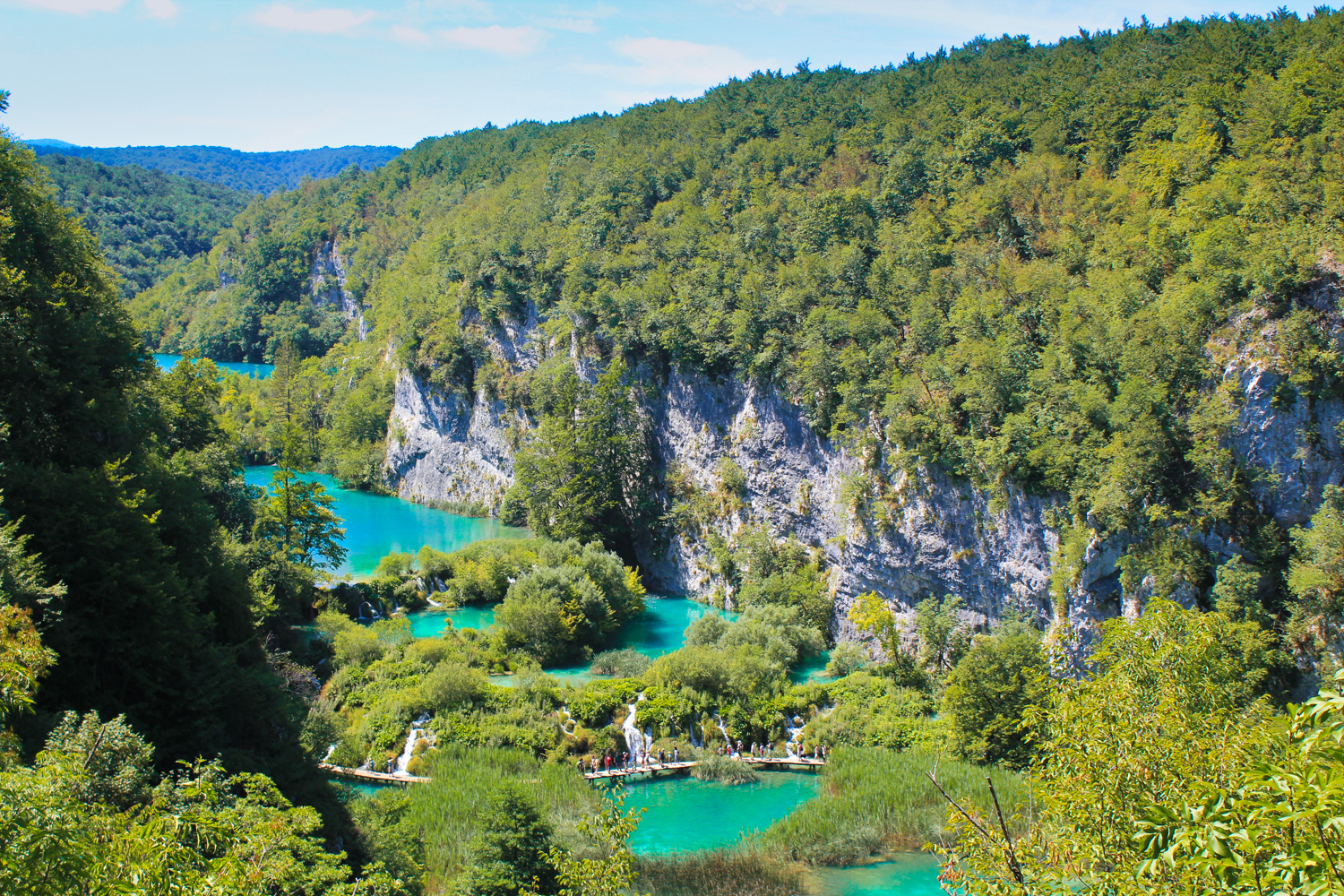
As always with travel, it’s possible to cut your accommodation costs down to zero if you have the time and patience to seek out an offer.
Free Accommodation
Couchsurfing exists in Croatia, and allows you to stay with a local for free, sleeping on their sofa and gaining their insight into life in their country. It’s not the most comfortable of living situations, but if your budget is tight, it’s worth sending out a few requests to hosts to see if anything comes of it. You can search for potential hosts on the site.
Housesitting is another option. This is where you’ll take care of somebody’s house for free while they’re away, and usually look after their pets, too. It’s best for long-term travellers or retirees as you can’t pick and choose dates and destinations, so you need to have a lot of flexibility as to where you go and at what time of year. If you do have that freedom, it’s a wonderful way to cut down your travel expenses, soak up some home comforts, and live like a local for a while — I’ve even have friends who have landed housesitting gigs in a castle! Trusted Housesitters is my favorite site for finding housesits — it’s definitely worth taking a look to see if any listings match with your dates.
And finally, if you’re travelling long-term and don’t mind getting your fingers dirty, you could look at WWOOFing or WorkAway as a way to cut down your costs while working on a farm in exchange for accommodation and food. It’s not the most glamorous of travel, but getting to live for free in a foreign country is an incredible experience, so if you’re backpacking around Europe, this may be the way forward for you.
Affordable Accommodation
I’m suspecting, though, that for most of you, you’re not interested in the free accommodation and just want somewhere clean, safe, and affordable to rest your head each night. If that’s the case, there are several options available for you.
The first of these are hostels. In Croatia, you’ll come across hostels all over the country, finding them on tiny islands, in large cities, and even in the national parks. They’re one of your best options for saving money.
Hostels in Croatia are slightly cheaper than equivalents in Western Europe, with the big exception being Dubrovnik over the summer, which is eye-wateringly expensive. You can expect to spend around €20-25 for a dorm bed in most spots in Croatia, with the price increasing to €30-40 a night on the popular islands, national parks, and more tourist-filled areas.
When it comes to private rooms in hostels, you can expect to spend around €60 a night for a clean, basic room in a good location, so if you’re travelling with friends or with your partner, you may find there’s not much in it if you’d prefer a little privacy over settling for two beds in a dorm room.
If you’re an older traveller and put off by the thought of nights spent in hostels, you shouldn’t be! Private rooms are usually very quiet and clean, and most hostels are modern, safe, and centrally located. They tend to have a little more personality than generic hotels, and the staff are fantastic at offering kickass travel advice. As long as you check the reviews of any hostel before booking it to make sure nobody refers to it as a party hostel, you’re all good to make a booking there.
I use HostelWorld to find the cheapest hostels, as they tend to have the greatest number of listings at the lowest prices.
And, of course, there are always hotels and apartments, which will usually cost around €70-€100 a night for a decent, clean, mid-range property in a central location in shoulder season. I always use Booking, as they have the most accommodation options for the cheapest prices.
The Best Hostels and Guesthouses in Croatia
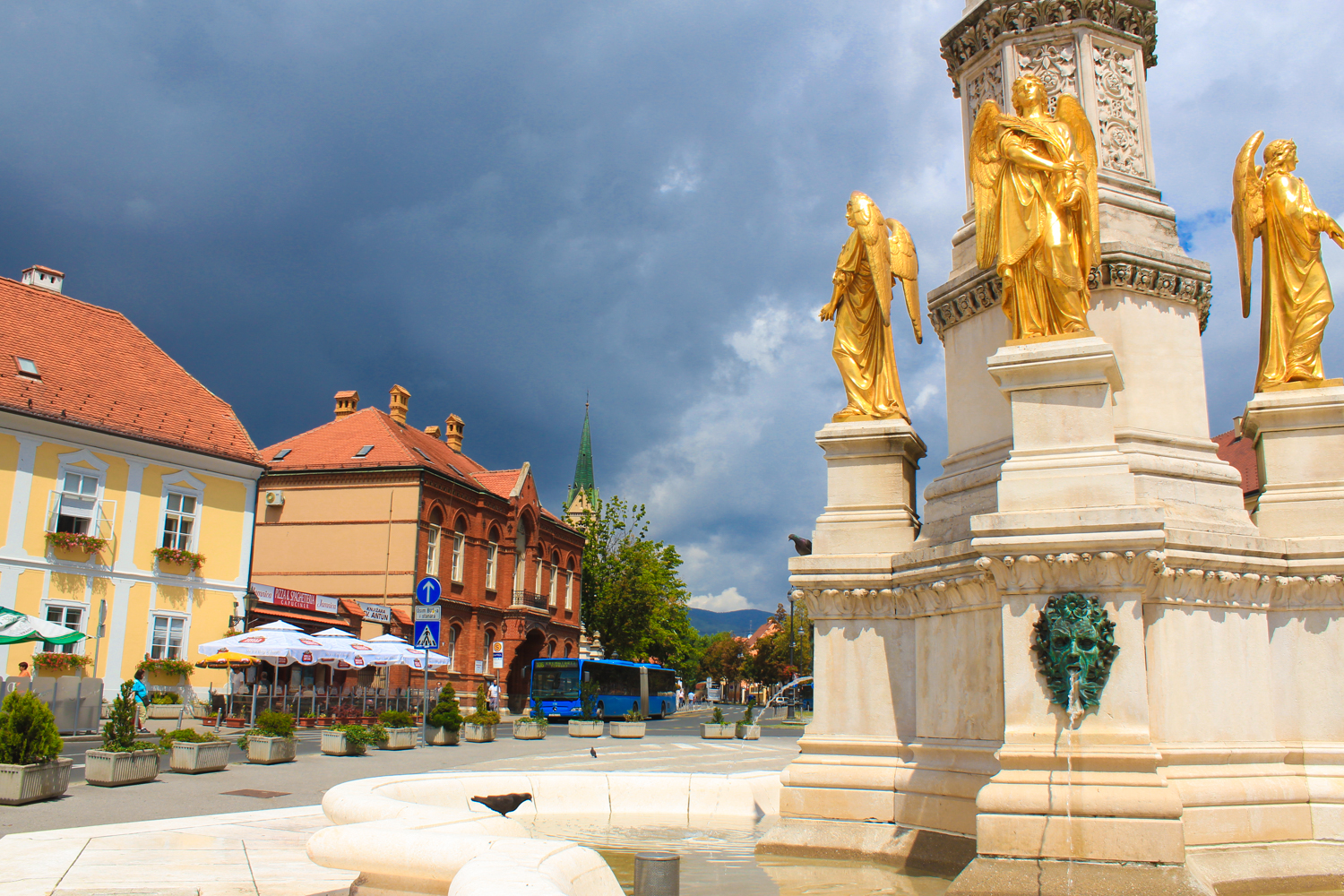
As I mentioned above, I’ve visited Croatia during various stages of my travel career, both as a solo backpacker who was travelling on a shoestring budget and as part of a couple that was looking for all things private and mid-range. I’ve learned a lot about how to travel affordably through this country in the process.
I always like to share which accommodation I stayed in on my travels, as well as recommend alternatives when mine sucked. Everywhere I recommend below has excellent reviews and offers great value for money. On my most recent two-week trip around Croatia, I followed this itinerary:
Dubrovnik: 3 nights
Split: 3 nights
Zadar: 3 nights
Plitvice: 2 nights
Zagreb: 3 nights
Here’s my list of my favourite accommodation options in Croatia, listed in Euros:
Dubrovnik — Apartments Sv.Jakov (€145 a night): There’s two things you need to know about accommodation in Dubrovnik. The first is that it’s expensive, and the second is that staying inside the old town is extremely expensive. The good news is that Apartments Sv.Jakov solves both of those problems by being both affordable and accessible to the centre of town (a 15 minute walk from your room). But not only that, it also has one of the best views in the entire city and some of the best reviews of any property. Throw one of the friendliest owners in the country in the mix and you can see why I’m gushing its praises. This is an excellent option for Dubrovnik.
Split — Apartment Citadela (€110 a night): Split is full of expensive hotels. In fact, you’ll struggle to find a stay in one for under €200 a night. I recommend Apartment Citadel because it’s half the price of the hotels, receives incredible reviews, and right in the heart of town — it’s a truly fantastic location! And you’ll have access to a kitchen, too, to help you save money on meals.
Zadar — Harvey’s Luxury Rooms (€55 a night): This is a no-brainer when it comes to accommodation in Zadar! It’s inexpensive, in the centre of the old town, close to tons of excellent restaurants (I recommend Kantuna), and a super-accommodating owner. With some seriously nice furniture providing decoration in the rooms as an added bonus, you really can’t go wrong.
Plitvice Lakes National Park — Lake House (€55 a night): I loved both of my stays at Lake House in Plitvice Lakes National Park and have sent so many of my readers there since visiting! I chose this place because it’s easily the best-rated accommodation that’s close to the park, and it’s pretty affordable too. It didn’t disappoint. You’ll likely spend most of your time walking in the park, but when you’re at the house, you’ll be greeted by lovely staff, presented with a filling breakfast, and marvel at the fresh air. That’s one of my lasting memories of the area Lake House is in: how peaceful the surroundings were, and how healing the clean air felt.
Zagreb — Embassy Row B&B (€160 a night): It’s rare to check out the reviews of accommodation and find yourself greeted with a wall of 10 out of 10s, but that’s exactly what drew me to Embassy Row B&B. If there’s a better spot in Zagreb, I’d be seriously surprised. What I love about this place is the lavish, fresh breakfast, the great location, and the wonderful owner. Nadia is kind, friendly, welcoming, and only too eager to give recommendations on how to make the most of your time in the city. I wouldn’t consider staying anywhere else.
How to Save Money on Transportation in Croatia
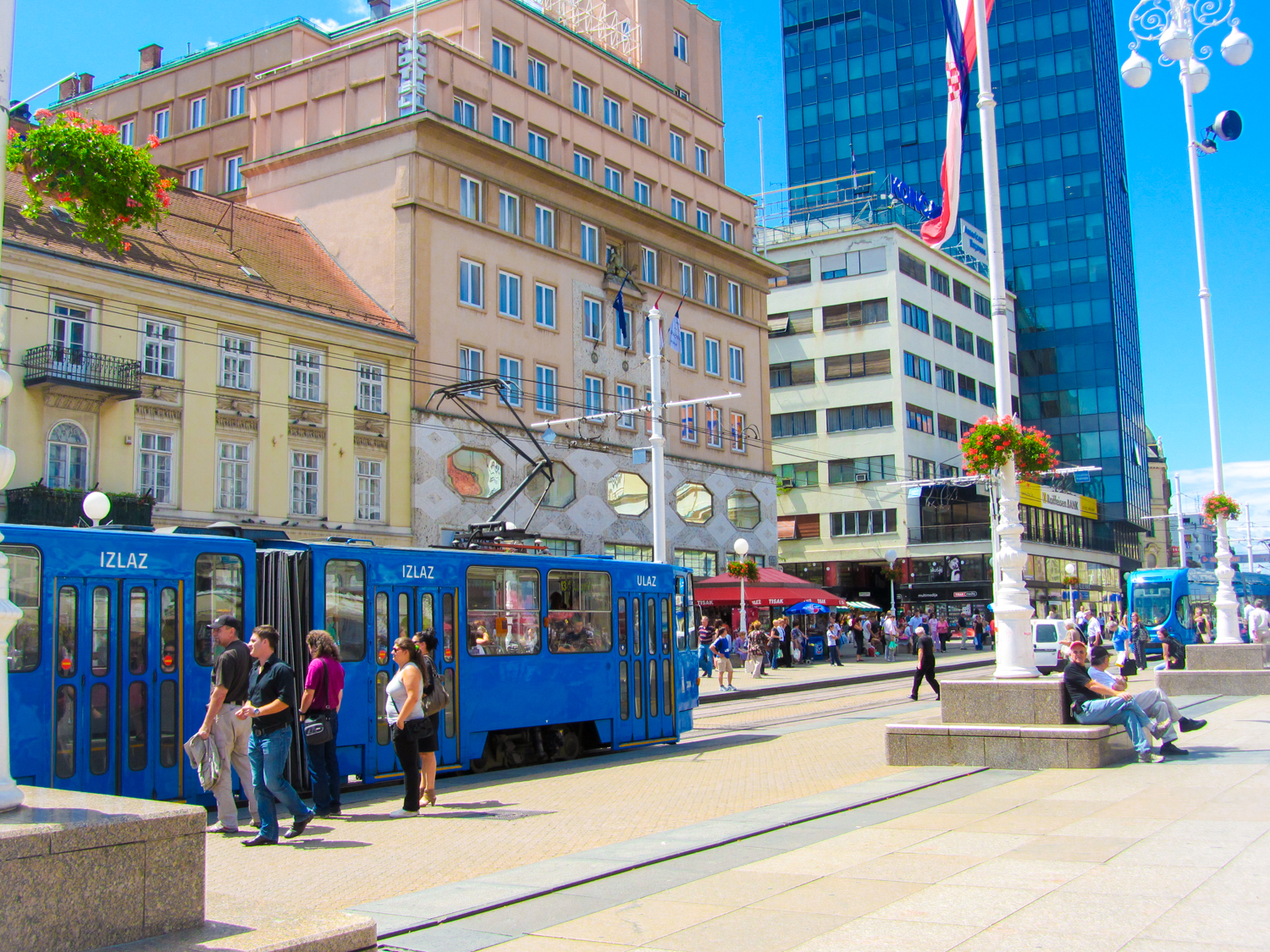
Transportation is fairly inexpensive in Croatia, so you won’t need to worry about it upping your travel budget by too much. The best, easiest, and cheapest way to travel around the country is by bus or ferry.
Domestic buses will take you pretty to much anywhere you need them to, and are fast, comfortable, and modern. You can expect your ride to come with power sockets and Wi-Fi, air conditioning, and large, spacious seats, making it a no-brainer to go for the bus over anything else.
If you book your bus tickets in advance through Arriva, you can save 5% on the price of your ticket by using the app, and not have to worry about the bus being full.
If you’re anything like me, though, you can’t imagine visiting Croatia and not spending time on some of its gorgeous islands (my personal favourites are Brac and Pag). In this case, you’re going to want to hop on a ferry to get from the mainland to paradise. You can find a map of the ferry routes on CroatiaFerries — and most ferries run at least once a day in peak season.
Keep in mind that if you’re going to be renting a car in Croatia, you’ll pay quite a bit extra to take it on the ferries, so it may work out cheaper for you to find somewhere to park for free before heading to the islands on foot. On average, you can expect to pay €15-20 a day to hire a small car in Croatia depending on the time of year and where you collect it from.
When it comes to hiring a car to drive around Croatia, you shouldn’t feel intimidated. Even my parents managed a two-week road trip around the country without any hassle, and said it was a far more peaceful experience than driving in nearby Italy! I always hire a car through Discover Cars: a comparison search engine that brings up the best deals from all the popular providers; I always seem to score the cheapest deals through their site!
As always, you’ll have far more independence if you decide to drive through Croatia, as you’ll be able to stop off whenever you feel like it, take detours to tiny villages, and stop at spectacular viewpoints to take photos whenever you want. This is a country that rewards those who venture off the beaten track, and hiring a car is the easiest way to do so.
Parking is going to be your main issue when it comes to driving in Croatia. Many of the popular tourist destinations are pedestrianised, so you may find yourself driving around for half an hour in search of a parking space. If you’re happy to park up at your accommodation and then take public transport or walk, you’ll have a much easier time of it.
You can also hire scooters in Croatia, so if you’re competent on two wheels, you may want to opt for this instead! You’ll pay less to hire them and won’t find parking as difficult either.
Flying is typically expensive and time-consuming, so you’ll want to skip out on that if at all possible. You’ll save money and see a lot more of the country by travelling overland.
Here are some of the typical transportation costs you can expect to run into while in Croatia:
- Bus from Dubrovnik to Split: €22,10
- Bus from Zagreb to Zadar: €11,90
- Bus from Zagreb to Plitvice Lakes: €14,90
- Bus from Zagreb to Pula: €26,20
- Ferry from Dubrovnik to Hvar: €45
- Ferry from Dubrovnik to Brac: €45
- Ferry from Split to Brac: €20
How to Save Money on Food in Croatia
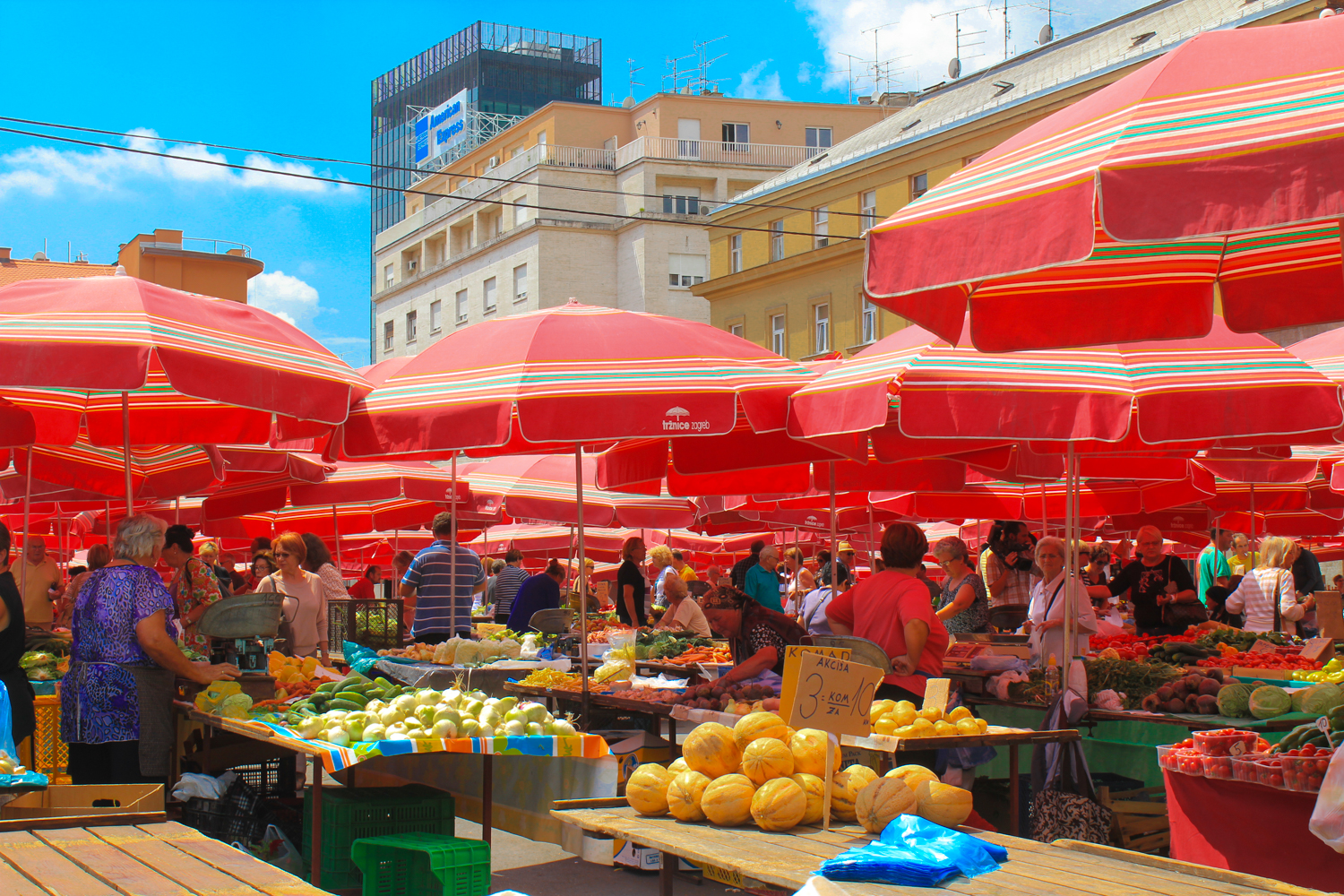
Food can be expensive in Croatia, but there are plenty of ways to cut costs while you travel around this beautiful country.
Cooking is always going to be more affordable than eating out, so if you’re willing to sacrifice some restaurant meals on your vacation, this is a great way to keep on track with your budget. Hostels will usually give you access to a shared kitchen, and if you’re opting for an apartment, check that it has a kitchen and at least basic cooking facilities. If that’s the case, you can head to a local market (a great cultural experience) and stock up on fish, vegetables, and fruits, to spend far less on your meals than you would at a restaurant.
Many hotels offer free or discounted breakfasts, so if that’s the case, I always recommend eating later in the morning and eating a lot of food, as you may find you’re too full to have lunch. If that’s not the case, then I recommend going for a larger lunch and a smaller dinner.
Most restaurants charge less for their lunch menus, even though they’re serving the exact same meal for lunch and dinner. If you can eat a bigger meal for lunch, you can then get by with a much smaller one for dinner and save money through doing so.
In general, you should expect to spend the following on each meal:
Breakfast: €6.50 each for bacon and eggs; €9-11 each for something in a hipster cafe.
What can you expect from breakfasts in Croatia? If you’re looking for something cheap and simple, you can’t go wrong with pašteta (pate) on bread. Bread and spreads are commonplace in the country, whether it’s margarine, the aforementioned pate, cheese, jam or Nutella. Often, these will be accompanied by cold cuts of meat, such as ham, prosciutto, and salami.
In cafes, you’ll regularly be able to pick up some burek, a savoury pastry containing meat, cheese, or vegetables. Pair it with a serving of yoghurt and you’ve got yourself a traditional Croatian breakfast!
Beyond that, you’ll be able to find those standard omelettes, oatmeal, full English breakfasts, and croissants that you can get across the continent, either served up in your accommodation or up for grabs in a cafe in town.
Lunch: €7 each for a sandwich/slice of pizza from a deli with a soft drink
Lunches in Croatia can be delicious and large. Croatians prefer to have a larger meal for lunch and a smaller portion of food for dinner, so loosen up those waistbands and prepare yourself for a true feast! You’ll typically kick things off with some soup to start, then follow that up with some slow-roasted meat, which is practically guaranteed to be so tender that it’s falling off the bone, accompanied by potatoes and vegetables.
Dinner: €15 each if you’re on a budget, €25 each for a mid-range restaurant, €50+ each for something higher-end.
One thing to keep in mind is that you’ll often be given freshly-baked bread, olive oil, and balsamic vinegar with lunches and dinner in Croatia, so you should aim to take full advantage of this. Seriously — this was one of my culinary highlights from Croatia. Most of the time it was free with the meal and so ridiculously tasty.
What about tipping? In most restaurants you’ll frequent, tipping will be welcome but not in any way expected. So don’t panic — it isn’t seen as offensive if you don’t tip! And likewise, it won’t be viewed as offensive if you do. Expect to pay 10-15% in any fancy restaurants you head to, but anything laidback and local won’t require you to pay extra.
I don’t often have much success with this suggestion, but I do recommend keeping an eye on your drink consumption while travelling in Croatia. Alcohol is obviously a big budget buster on the road (and Croatian wines can be quite pricey in restaurants), so if you’re happy to substitute the sodas, juices, and booze for tap water, you’ll save a ton of money. And yes, the tap water is free and safe to drink in Croatia, so you really don’t need to worry about buying bottled water.
If you’re determined to jump headfirst into the Croatian food scene and don’t want to spend your vacation cooking, you should look to eat at the konobas and pizzerias as opposed to the fancier restaurants.
Konobas are small family-run restaurants that offer big dishes and low prices, and sometimes even family-made wine. If in doubt, avoid anywhere with white tablecloths and a big English menu outside, because that means it’s set up for tourists and charging more. Delis are great options for lunches, as they offer sandwiches for low prices.
You can always ask the locals for food recommendations, too! Ask at your accommodation for recommendations on the best budget eats, or simply walk around and see which restaurants are full of locals. In the case of the more tourist-filled cities, like Dubrovnik, you’ll find that just walking a couple of blocks outside of the Old Town is all you need to do to find cheaper prices in restaurants.
Here are some typical prices of food and drink in Croatia to help you budget better:
- Pint of draught beer: €3-5
- A bottle of house wine in a restaurant: €23-50
- A slice of pizza: €2.50-5
- Sandwich from a deli for lunch: €3-5
- A 30 cm pizza for dinner: €8-15
- Seafood dish in a fancy restaurant: €30-50
- Cappuccino in an expat area of town: €2-3
- Litre of milk: €1-1.50
- A loaf of bread: €1.50-2.50
- 10 eggs: €2.50-3.50
- 1 kilogram of tomatoes: €2-3.50
- 1 kilogram of potatoes: €0.80-1.40
- A 1.5l bottle of water: €0.90
- A risotto for lunch: €12-20
- A steak dinner: €20-30
- Famous Croatian lamb from the spit: €15-30
- A gyros for lunch: €5-8
- A local meal from a konobos for dinner with wine: €20-35 each
- A three course meal and wine in a high-end restaurant in Dubrovnik: €70-100+
How to Save Money on Activities in Croatia
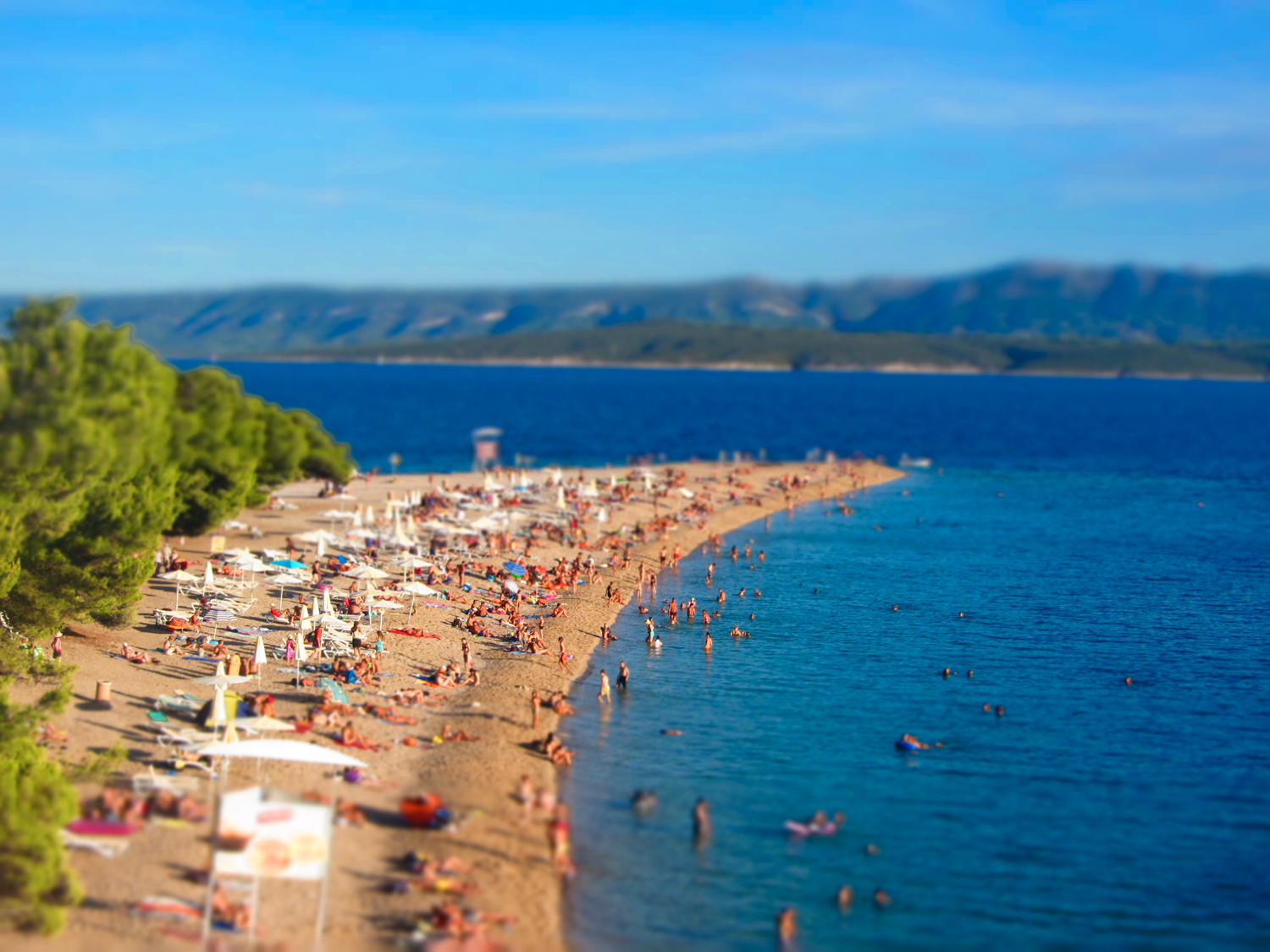
We’ve covered accommodation, transportation, and food, but let’s face it: you’re not going to have the trip of a lifetime if you skip out on entrance fees and activities! Here’s a detailed breakdown of some of the costs you’re likely to encounter while travelling around Croatia. Note that prices for many attractions go up a lot during peak season: I’ve given a range where that’s the case.
- Walking the city walls in Dubrovnik: €15-35
- Entrance to Plitvice Lakes National Park: €10-40
- Entrance to Krka Waterfalls National Park: €7-40
- A Game of Thrones-themed walking tour in Dubrovnik: €25
- Entrance to Pula’s amphitheatre: €10
- Sea kayak tour at sunset with snack and wine in Dubrovnik: €45
- A day trip to Montenegro from Dubrovnik: €60
- Skip-the-line entrance to the Museum of Broken Relationships in Zagreb: €7
If you’re in Split for a few days, be sure to grab a free SplitCard from a tourist information centre. Visitors staying five or more nights in summer, or two or more nights in winter, are entitled to the card for free, and get discounts on everything from museums and galleries to excursions and restaurants.
If some of the above prices are just too much, there are plenty of free activities in Croatia as well. I know that I had a fantastic time simply wandering through the old towns, exploring local markets, sunbathing on beaches, and making the most of the museums that don’t charge for entrance.
While, for example, you’ll get a great view of Dubrovnik by walking the city walls, you could be just as satisfied by walking the streets of the old town, as it’s as beautiful from the ground as it is from above. If you love beaches, you’ll save money on activities by lounging out on the sand/pebbles rather than jumping on a banana boat or hiring some snorkelling gear.
Markets are always a great way to get a taste of the local culture without spending any money, and simply heading out for a stroll through some of the more local neighbourhoods will introduce you to lesser-visited parts of the country. Yes, if you’re looking to save money on activities, my biggest recommendation is to walk everywhere — Croatia is so beautiful that there’s always something wonderful to see.
If, like me, you love taking tours to get to know a country better, I recommend heading to Get Your Guide for inspiration — it’s where I book all of the tours I take. They have a whole range of activities and tours available, like day trips to Bosnia (€82) or Slovenia (€120) to boost your country count, a Game of Thrones tour in Split (€35), and an island-hopping trip to five Croatian islands (€105).
Miscellaneous Items to Buy for a Trip to Croatia
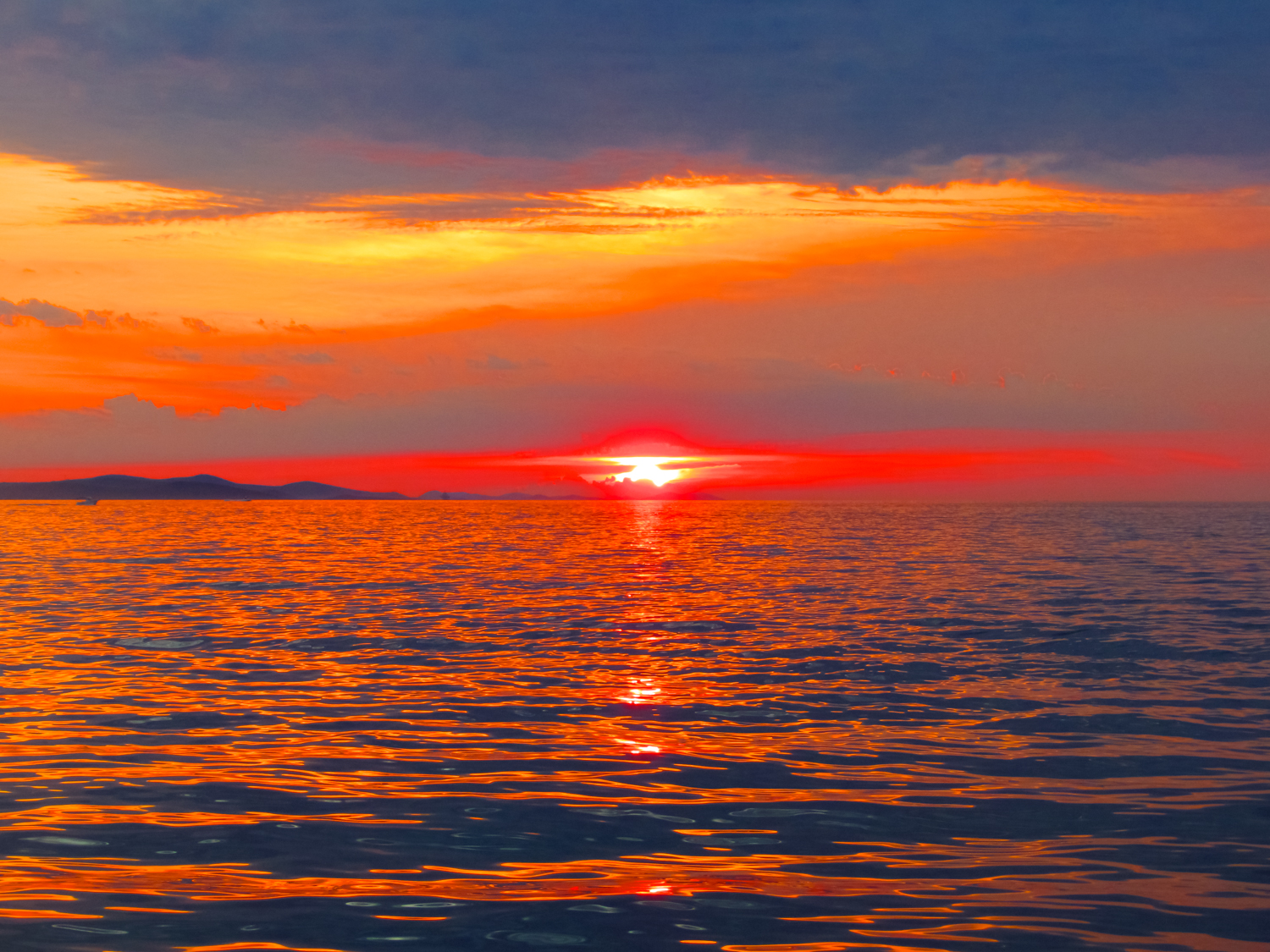
A Croatia guidebook: A guidebook will give you an in-depth look into Croatia’s culture, suggest the perfect itineraries for the amount of time you have, and offer recommendations for where to eat and what’s worth doing. I like Lonely Planet guidebooks, and have a wide selection sitting in my bookcase as I write this!
A dry bag: Croatia is all about the water, so I highly recommend packing a dry bag to take with you. A dry bag has saved me while travelling on so many occasions:
- On a kayaking trip from Koh Yao Noi to Koh Nok, a freak wave splashed over me, as well as my camera and phone. Had I not had them in a dry bag, the water damage would have likely destroyed them.
- On a ferry ride in Thailand, the boat sprung a leak and began to sink. I was able to put my laptop, camera, hard drive, passport, and money in my dry bag, seal it up, and know that they’d stay safe and dry if the worst were to happen.
- I chartered a yacht in Greece and relied heavily on my dry bag while I was there. When mooring in tiny bays, I was able to fill my dry bag with my camera, towel, and sunscreen, jump in the sea, and swim to the nearest empty beach without worrying about keeping my belongings dry.
- I also think dry bags are fantastic for solo travellers on beach days. It’s tough going to the beach when you’re travelling alone because you’ll need to bring nothing with you, risk getting robbed while you’re in the ocean, or stay on the sand at all times. If you have a dry bag, you can fill it up with your valuables and take it for a swim with you, rather than leaving them on your towel and hoping nobody will grab them.
I love all things Sea to Summit, and after trying several of their dry bags out, my champion is the Ultra-Sil 8L — it’s durable, thin, lightweight, and has never let me down.
Travel insurance: If you’ve read any other posts on Never Ending Footsteps, you’ll know that I’m a great believer in travelling with travel insurance. I’ve seen far too many Go Fund Me campaigns from destitute backpackers that are unexpectedly stranded in a foreign country after a scooter accident/being attacked/breaking a leg with no way of getting home or paying for their healthcare. These costs can quickly land you with a six-figure bill to pay at the end of it.
In short, if you can’t afford travel insurance, you can’t afford to travel.
Travel insurance will cover you if your flight is cancelled and you need to book a new one, if your luggage gets lost and you need to replace your belongings, if you suddenly get struck down by appendicitis and have to be hospitalised, or discover a family member has died and you need to get home immediately. If you fall seriously ill, your insurance will cover the costs to fly you home to receive medical treatment.
I use SafetyWing as my travel insurance provider, and recommend them for trips to Croatia. Firstly, they’re one of the few companies out there who will actually cover you if you contract COVID-19. On top of that, they provide worldwide coverage, don’t require you to have a return ticket, and even allow you to buy coverage after you’ve left home. If you’re on a long-term trip, you can pay monthly instead of up-front, and can cancel at any time. Finally, they’re way cheaper than the competition, and have a clear, easy-to-understand pricing structure, which is always appreciated.
With SafetyWing, you’ll pay €1.50 a day for travel insurance.
SIM cards and eSIMs: Assuming that you’re like me and want to have a working phone as soon as you arrive (did you even go to Dubrovnik if you can’t send photos of it to everyone you know?), you’ll want to buy an eSIM before leaving home.
I use aloSIM these days: prices are good and I’ve found their speeds to be faster than the other companies I’ve used. It costs $15 (€14) for 5GB of data that lasts a month, or $24 (€22) for 10GB, and you get a 5% discount by using the code FOOTSTEPS.
If your phone can’t use eSIMs, a tourist SIM card with unlimited data from T-HT costs €10 for ten days. If you’re staying longer, a card with 70GB of data that lasts for a month is €11.95. You’ll need to find a phone store in whichever city you arrive in to buy them, though: they’re not available at the airports.
Don’t forget that if you live in another EU country, you should be able to roam for free with your normal phone company.
How Much it Costs to Travel in Croatia

I always like to share my own personal expenses when travelling in a country, as I think it helps you figure out what you should be expecting to pay each day while you’re there. A list of expenses is great and helpful, of course, but putting them all together in order to come up with a reasonable estimate can be trickier.
Because prices have risen recently in Croatia, I’m only using the costs from my most recent trip. Here’s what I spent!
Accommodation: €109 per day (shared between two = €54.50 each)
Transportation: €9 per day
Food: €34 per day
Activities: €36 per day
My average daily cost of travel in Croatia is therefore: €133.50 per day.
Related Articles on Croatia
🧳 How to Pack for a Trip to Croatia
☀️ 30 Incredible Things to Do in Dubrovnik, Croatia
🇭🇷 20 Best Things to Do in Zagreb, Croatia

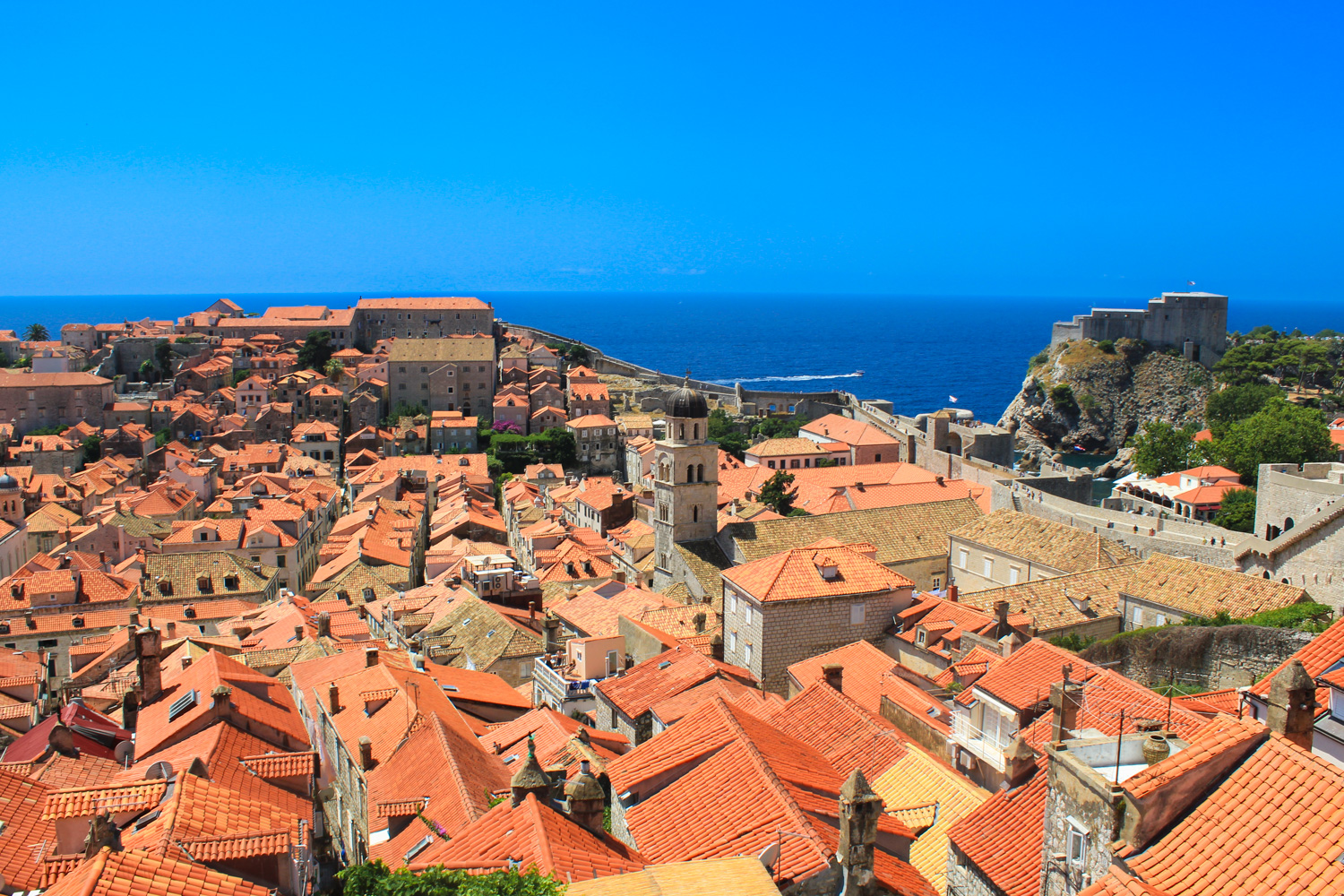


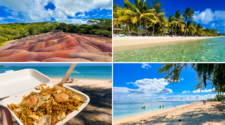


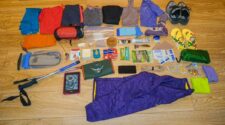
Dude, this guide is fantastic!
If I were there, I would have a really hard time leaving! I understand why you extended your initial trip by a few weeks.
Right?! The longer I spent in Croatia, the more I wanted to see. You could spend months just travelling up and down the coastline.
Hello!
I do not think that this is nice: ‘I usually recommend not staying in an entire Airbnb apartment’.
You should know, that most of the people on the coast and on the Islands, live from renting apartments, from 30 euro and up and also, when you stay in apartment you can save a lot of money for food (not 23 euro a day for shore).
So you help local people and you save money at the same time. 😊
Wish you a nice day.
Valentina
Airbnb is destroying cities and towns around the world, and having seen this destruction first hand, I am not comfortable recommending my readers to stay in Airbnb apartments. You help the locals who own properties, sure, but you fuck over everybody else who now can’t afford to pay rent because everything in their town is now an expensive Airbnb apartment. It raises the prices of accommodation for locals.
So sorry, I believe staying in Airbnb apartments is an unethical practice and I don’t support it. Do you own an Airbnb apartment?
Very nice!
Thanks Kris! :)
I wasn’t sure about visiting Croatia later this year, but the photos in this post now have me convinced! It looks like a very beautiful country. One small suggestion I have is that it would be useful if you could share some of the costs of food and drink so that we can create a travel budget with more ease. Appreciate all of your tips in this very useful post.
That’s a great suggestion, Kimme! My posts are always a work in progress, so I love receiving feedback on how they can be improved. I’ll get working on that today :-)
Great advice! My question to you is where would you recommend going in Croatia if you had just two weeks in August and a small budget? Thank you
Hmmm. If it was me, I’d do the following:
3 nights in Zagreb
2 nights in Plitvice
3 nights in Zadar
3 nights in Split
3 nights in Brac
And then back to Split to fly out. I’d avoid both Dubrovnik and Hvar as they’re going to be very expensive over summer.
Wow! Holy Moly. It’s my dream to see a landscape like the ones you’ve shared in this post. I haven’t been to Europe before (I live in the USA) so I have other countries at the top of my bucket list before Croatia but this is making me think I need to visit Croatia too. There’s too many places in this world to see!
I definitely understand that, Sheryll. But while Western Europe often receives all of the glory, there are parts of Eastern Europe that are just as beautiful. I hope you make it to both sometime soon :-)
Well I was so pleased with my Italian Lake photos until I saw these!!! Awesome
Thanks, Dad! :-)
Hi!
I will be there in Croatia in the middle of August. Appreciated this guide as it helped me understand how much I will spend when there. Should I not go to Dubrovnik in August because it will be busy/costly?
Kind regards
Hmmm. Well, I really liked Dubrovnik, but it was packed in the summer months! It’s a beautiful spot and there’s a reason why it’s so popular with cruise ships and tourists, but you have to weigh up whether that beauty is worth spending a lot of money and dealing with a ton of crowds. If you can afford it, go for it. If you’re worried about the costs, choose to go somewhere like Split instead.
Wow, easily the best guide to Croatia I’ve seen today. Thank you for putting all of this information together, very useful. I plan to visit Croatia in April so I’m releaved to see it won’t be too expensive at that time of year.
Thank you so much, Ofelia! That means a lot. I hope you have a wonderful trip :-)
Really appreciated that you included everything in this post, Lauren. I’ve just bought the dry bag you recommended, as it sounds like a lifesaver!! Any thoughts on yacht week in Croatia? Costs, etc?
Thanks Jordan :-) I actually have a couple of friends who did yacht week in Croatia and they said that if you’re not really into partying it’s not a great option. They’re definitely pretty chill and found they didn’t really vibe with the people on their boat who were all about drinking and hooking up.
In terms of costs, well, I haven’t actually done it myself, but from a quick look online, it looks like it’ll cost around $4,000 for the yacht for a week, although you’ll be splitting that with a bunch of people, so it might not work out to be that expensive.
Hope you have a great trip if you do decide to go. You’ll have to let me know what Yacht Week is like!
Amazing photos. This was a really helpful post for my upcoming trip and I’ll be sure to stay at some of the guesthouses you recommend too.
No problem! Glad you found it useful :-) Have an amazing trip!
Wonderful post, Lauren, coming from a Croatian. I wonder though have you visited islands like Hvar or Brač and checked their beautiful sunsets. Btw, I’m impressed with your knowledge about places you visit and some details that even I wasn’t aware of. You’ve done your homework, girl!
Thanks Mimo!
I spent a few days in Brac, and also visited Pag too. Didn’t get a chance to see many sunsets there though!
WE LOVE CROATIA! Great post Lauren. Covers everything I could say and more about the cost of travel in Croatia. Cracking read. Great. We celebrated our 10 year wedding anniversary in Split and have been returning every two years ever since. Love it. If anyone’s reading this and debating whether to go or not, I say do it! One of my favorite countries.
Wow, what a recommendation! Split sounds would be a pretty perfect place to celebrate an anniversary.
YES! I love Croatia and I love this post, Lauren. I agree that it’s more expensive than other countries in the Balkans, but it’s still a lot cheaper than countries in Western Europe. One thing I couldn’t believe was how expensive it was to walk the city walls in Dubrovnik. Not worth the money imo.
Yeah, seriously. Dubrovnik as a whole can be pretty over-the-top expensive — it was a bit of a shock to the system when I landed on my first day of my big trip and was like whoa, my money is not going to last as long as I thought. Fortunately, everywhere else in Croatia was much more affordable, and let’s face it: Dubrovnik is pretty special, so it’s worth the expense to a lot of people.
OMG I really can’t wait to get to Croatia etc one day – so awesome hun =)
You’d love it here!
This has me looking at flights to Croatia based on those stunning photos alone! I’m a mega GoTs fan so the fact that you mentioned all of those tours is so exciting. I’d love to see all of the filming locations, and then the beautiful beaches will just top it all off nicely.
You know I haven’t ever watched Game of Thrones before? A big oversight of mine! But I know that my friends who love the show have had so much fun geeking out over all the filming locations in Dubrovnik and Split. I hope you decide to book a flight to Croatia!
So many great tips in this article. You’ve made planning this trip so much easier. I now feel like I can visit Croatia on the cheap while retaining some comfort levels. Looking forward to trying to food after you have sold it so well. Thanks.
Hey, thanks so much! Enjoy all of that fresh and tasty seafood for me :-)
I really didn’t know much about Croatia until I stumbled across this post. Fantastic! You’re really selling it to your readers and now I’m trying to work out if I can squeeze in a visit before the end of summer.
Ooh, I hope you can! September would be a really good time to visit, as there aren’t many crowds and the prices are starting to drop.
I’ve been to Croatia numerous times from AUSTRALIA as I’m addicted to the country, easily one of the most beautiful places in the world. It’s the sort of place that you don’t need landmarks and sites because the atmosphere, nature, beauty, medieval feel , smells, sounds just make this place heaven on earth for me. One of my most amazing sights was driving to our base on the beautiful island of Murter from a late night clubbing. It was 5.30-6am approx in the morning and the sun was coming up as we were crossing from the mainland to the island via bridge and at that moment the colours an beauty of the place overwhelmed me. I have seen many beautiful sunsets in Croatia, what makes them amazing is the deep red and orange colours. I’ve never seen them so vivid anywhere and I’ve been half way around the world.
I totally agree with you about the sunsets! Some of the best I’ve ever seen were while travelling in Zadar. Incredible colours!
Thank you so much for putting this together. I have been trying to work out where to go with my boyfriend on holiday next week and I think I’ve just settled on Croatia. Your post made it really easy to decide with all of the photos and information on how to travel there on a budget. I love your style of writing as well.
Thanks so much, Charlotte! You’re going to have an amazing trip :-)
Hi Lauren.
If you could travel to Croatia during any month, which would you choose? Taking into account the weather, the crowds, and the prices. I’m thinking May or September is probably best? Do you have strong feelings either way?
I’d probably go for September, just because there’s a school holiday in May that might clash with your travel dates and could push the prices up. For weather, as well, the average temperatures in September are around 25, compared to 22 for May. So not a huge difference, but 25 is a little nicer in my eyes.
I don’t really think you’d regret going for either month, but I’d probably choose September.
Amazing blog Lauren. What do you recommend for a solo traveler to Croatia btw? Should I stay in hostels and is it safe? Did you get lonely on your own or is it easy to meet people? I know I need to just get there and experience it for myself but its always intimidating to go to a new place by yourself.
Croatia is super safe! You really don’t have to worry, Emma. I never once felt in danger over my six weeks in the country, and found it easy to meet people in hostels. I’d recommend staying in them as a solo traveller if you’re looking to meet people — you could always stay in a private room if you’re not down for sleeping in a dorm.
Thank you so, so much for this detailed breakdown Lauren. Can I ask which islands you’d most recommend visiting if you have two weeks in Croatia? Are you missing out if you don’t spend much time on the mainland?
Fun question! One thing you could do is to fly into Dubrovnik, and then take the ferry up to Hvar and Brac, then fly out of Split, so that way you’d get to see some of the mainland as well as the islands. Korcula is another great option for an island that’s close to Hvar and Brac if you want less time on the mainland.
I personally really like the mainland spots in Croatia, and think they have just as much to offer as the islands, but it really depends on what you’re into. If you love beaches, they tend to be better on the islands. If you’re into mountains and villages, I think the mainland has better options.
Thanks for the wonderful tips! I’m thinking of going to Croatia from the US, possibly this coming April or May. What do you think about traveling there in April, mainly due to the weather and accessibility to shops, museums, attractions, etc.? Also, are you familiar with any tours offered that you could recommend as I may be traveling alone (I’m in my early 60s). Thanks!
Hi Lauren. It’s such an awesome article you built. I appreciate.
I am looking for a suitable market for pets and precious stones in Croatia. Please if you have an idea how I can go about this let me know.
Thanks
Ah, sorry, I’m afraid I really don’t know!
Thanks Lauren! This was really helpful in planning a daily budget for our delayed honeymoon/1 year anniversary trip there in September. We are flying into Naples and staying on the Amalfi Coast before driving across to fly from Bari to Dubrovnik. Then I planned Dubrovnik to Hvar, to Brac, to Markarska, to Split then fly to Venice then home:( . Does this seem like a good itinerary? I would’ve loved to make it up north more but maybe another trip. I cannot wait!!! Any advice is greatly appreciated.
Hi Lauren,
This information is great. Is it possible to see Croatia in a week?
For a week, I’d suggest picking either the north or the south. So for the south, you could check out Dubrovnik, Split, and Hvar/Zadar. And for the north, you could go with Zagreb, Plitvice, and Pula/Rijeka/Zadar. Or just choose two places for each, if you want more of a relaxed holiday.
Both itineraries would give you a good feel for the country, and I’d be happy doing either :-)
Hi Lauren
Your experience and information is amazing…thank you so much.
We are traveling to Dubrovnik on our way to Rome but only have 2 days.
Is there a self guided walking tour map of some of the movie sites in Dubrovnik?
We are renting a car and would love to see the non tourist beach you picture in your blog. Is there a name or information on how to get there?
Thank you so much and I hope you get to feeling better
The beach in that photo is Podrace Beach, in Brela. It’s unfortunately probably going to be too far for you to drive out to from Dubrovnik. For the filming locations, your best bet is just to google around. For example, this post is super detailed for Game of Thrones, with a map included: https://hellojetlag.com/dubrovnik-game-of-thrones-locations/ — there should be be similar guides for movies that have been filmed there, like Star Wars.
Hope you have a wonderful time in Dubrovnik! :-)
Thanks for all the info!! My bf and I will be heading to Croatia in late-June and we’ve planned to do a lot of grocery shopping on our own. How did you find the grocery stores and where would you recommend?? We’ll be in Dubrovnik, Split, Zadar and Zagreb overnight, but many other places for day trips.
Thanks!
In your opinion, is it safe to travel to Croatia? You’ve spent a lot of time there, so I’d love to know your thoughts.
Yes! Very safe. I didn’t have any safety issues in Croatia and feel comfortable recommending it as a safe travel destination. I feel safer there than I do in my home country and the U.S.!
Hey Lauren,
We plan to visit Croatia this September. Can you recommend a day or less bike tours that takes us to some cool places that is not too strenuous? Either by a guide or by renting bikes and exploring on our own. Your information has been so helpful to us and appreciate you taking all the time and effort in posting this.
Another great post, I can’t thank you enough for these budget travel guides. I’m planning on spending two weeks in Croatia in June, traveling to Dubrovnik, Split, Plitvice, and Zagreb, and I’m hoping to keep my budget under $60 a day. Do you think this is possible?
Hey Lauren, Lovely article :-)
I am planning to go Croatia this Sept with my 1.5 year old Infant. Will it be feasible to visit the places along with a kid, Also I am planning to hire a car along with driver or you would recommend to take daily trips from Zagreb to all across Croatia?
Many Thanks,
Shraddha
What a great post! Very informative – just what I needed. Thank you.
No problem! Hope you have a wonderful time in Croatia :-)
if you only had 5 days to see some of croatia, what would you do to make it worth it on the cheap?
A very comprehensive article. Thanks for taking the time to put it together – much appreciated. I’m still in the very early stages of planning my world trip but this info has sown the seed of curiosity about visiting Croatia thank you.
Yay! I’m so happy to hear that, Chris :-)
Great post Lauren and very informative. Thanks very much for this. Best regards, Nicholas
Thanks for reading!
Hi Lauren,
It might help to know that American Airlines has recently introduced a direct line connecting Philadelphia and Dubrovnik during the season months (June through September). If my memory serves me well, they will operate 3 flights per week.
Kind regards
Ivan
Thank you so much! Will add it to the post :-)
Thank you for the awesome guidelines :)
Thanks for reading! :-)
This has been so helpful! I noticed the typical pricing has the euro symbol next to it, have you given the pricing in euro to make things easier to compare to or is the price actually in Kuna as I read you should take Kuna. I’m going in 3 weeks and just trying to work out a budget
Amazing post, I almost convinced my wife that we will greece in October in between someone said why not greece and then I explored I found your post..I strongly believe that anyone reading your post is 100’% convinced with your recommendation. Thanks so much keep writing… we are planning to travel this October. Any advise that you can recommend ?
We also document every cent of our travels, partially to show how affordable travel can be, but mainly to ensure we stick to a budget. We only have limited funds (as do most people) and try to be frugal in some areas while still having the ability to learn about the culture, cuisine, people and history of a country.
And in the end, our costs were very similar to yours. Always good to have several data points to compare.
Sweet! Glad to hear your costs matched up with mine :-)
Hi Lauren,
This may be a hard question to answer, but I thought I’d put it out there:) I have dual citizenship (U.S. / Ireland) and was entertaining the idea of retiring in a European country. I was considering both Croatia and Portugal, based on my Internet research. I know that you spent some time in Lisbon and wondered how it would compare to, say, settling in Zagreb. I know Spanish so it would be easier to learn Portuguese. But I like where Croatia is situated (closer to more countries for visiting), and it also seems a little more affordable. It’s hard to get a sense of the cultures just by doing research online, but it sounds like the people are lovely in both places. I plan to visit soon and try it out, but I just wondered if you had any thoughts on this. Thanks, Rose
Hi Rose! Ah, those are two wonderful options :-)
You’re correct in that Croatia is more affordable, but the language would be tricker to learn. And that locals in both countries are lovely and so friendly! English is spoken widely in both countries, so there wouldn’t be too high of a language barrier either way. There’d be a much larger community of expats/retirees in Portugal, as it is such a popular retirement destination, so it would probably be a lot easier to build a community there. Lisbon, to me, feels more like an *international city*, in that there are tons of different restaurants and cuisines and immigrants from countries all over — Zagreb doesn’t have that as much.
I don’t know if that helps at all, but I think both options sound pretty good!
Your reply does help – thank you, Lauren! By the way, I’m sorry about the Brexit situation. I have an English cousin in Spain, and she was disappointed about the decision to leave. But on a positive note, it’s wonderful you live in a country that is so geographically close to so many interesting countries/cultures. I’m in Northern California, just outside of San Francisco (which sounds exciting), but you have to travel far (and by plane) to get to culturally distinct locations. I’m trying to keep my carbon footprint small, and I like the idea of visiting a variety of places by train. You’re fortunate that you have that option and at the same time be close to family. Thank you for your help and for a terrific website! Rose
is it possible to rent a car in Zagreb drive and cover all the major cities, I did this in Italy and covered – Rome, Venice, Florence and all the way to Sorrento & Amalfi coast, the highways were excellent
Hello Lauren! Great article, lovely read. I am looking to visit Croatia for a month or more if I love the country and I can see that you do not favor Airbnbs for reasons, which I understand. I do not wish to contribute to gentrification or high prices, so what are my options. I will bring my entire life with me (as I am living out of a suitcase at the moment) as well as my cat. I am sure that makes hostels out of the question. I’d like an entire place to myself. Is there a more ethical version to Airbnb? Thanks in advance!
Lauren, thank you!!
I am visiting Croatia and of course, I need to plan my expenses in advance. Your article really helped me with this issue I have been trying to figure out the past week.
Thanks for your blog and keep posing,
V.
Hi
We are going to Croatia in April 2022. Can you give us any idea about what to expect the weather to be like. Also it is our first time in Croatia for 10 days we would like to see as much as possible as well as some down time.
Thanks
Hello!
Great article, you’ve put a lot of effort into it, thank you for promoting my country in this way! :)
However, as I live in Croatia (Zagreb), I must correct prices you mentioned, because I don’t want people to be frustrated when they arrive here and see the prices with their own eyes. Prices in Croatia went up around 30 – 40% during year 2023.
Here is a fresh pricelist on today’s date, 15th of January 2024.:
Pint of draught beer: €2.50 – €3.50 (0.3 L), €3.00 – €5.00 (0.5 L)
A bottle of house wine in a restaurant (0.7 L): €23.00 – €50.00
A slice of pizza: €2.50 – €5.00
Sandwich from a deli for lunch: €3.00 – €5.00
A 30 cm pizza for dinner: €8.00 – €15.00
Seafood dish in a fancy restaurant: €30.00 – €50.00
Cappuccino: €2.00 – €3.00
Litre of milk: €1.00 – €1.50
A loaf of bread: €1.50 – €2.50
A dozen eggs: €2.50 – €3.50 (10 eggs, we don’t use a dozen as a measure)
1 kilogram of tomatoes: around €2.00 (during summer), €3.00 – €3.50 (rest of the year)
1 kilogram of potatoes: €0.80 – €1.40 (depending on season)
A 1.5l bottle of water: around €0.90 (tap water is free :))
A risotto for lunch: €12.00 – €20.00
A steak dinner: €20.00 – €30.00
Famous Croatian lamb from the spit: €15.00 – €30.00
A gyros for lunch: €5.00 – €8.00
A local meal from a konobos for dinner with wine: minimum €20.00 but expect €25.00 – €35.00
A three course meal and wine in a high-end restaurant in Dubrovnik: minimum €70 but expect €100.00 and more.
Best wishes, Tomi
P.S.
If anyone’s coming to Zagreb, let me know, I can walk you through the city sights. :)
Tomi, thank you so much! That is beyond helpful and I really, really appreciate it. Let me add the updated prices to my article now :-)